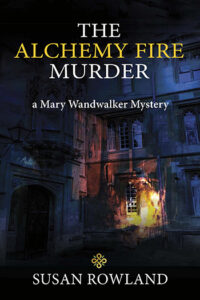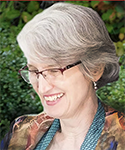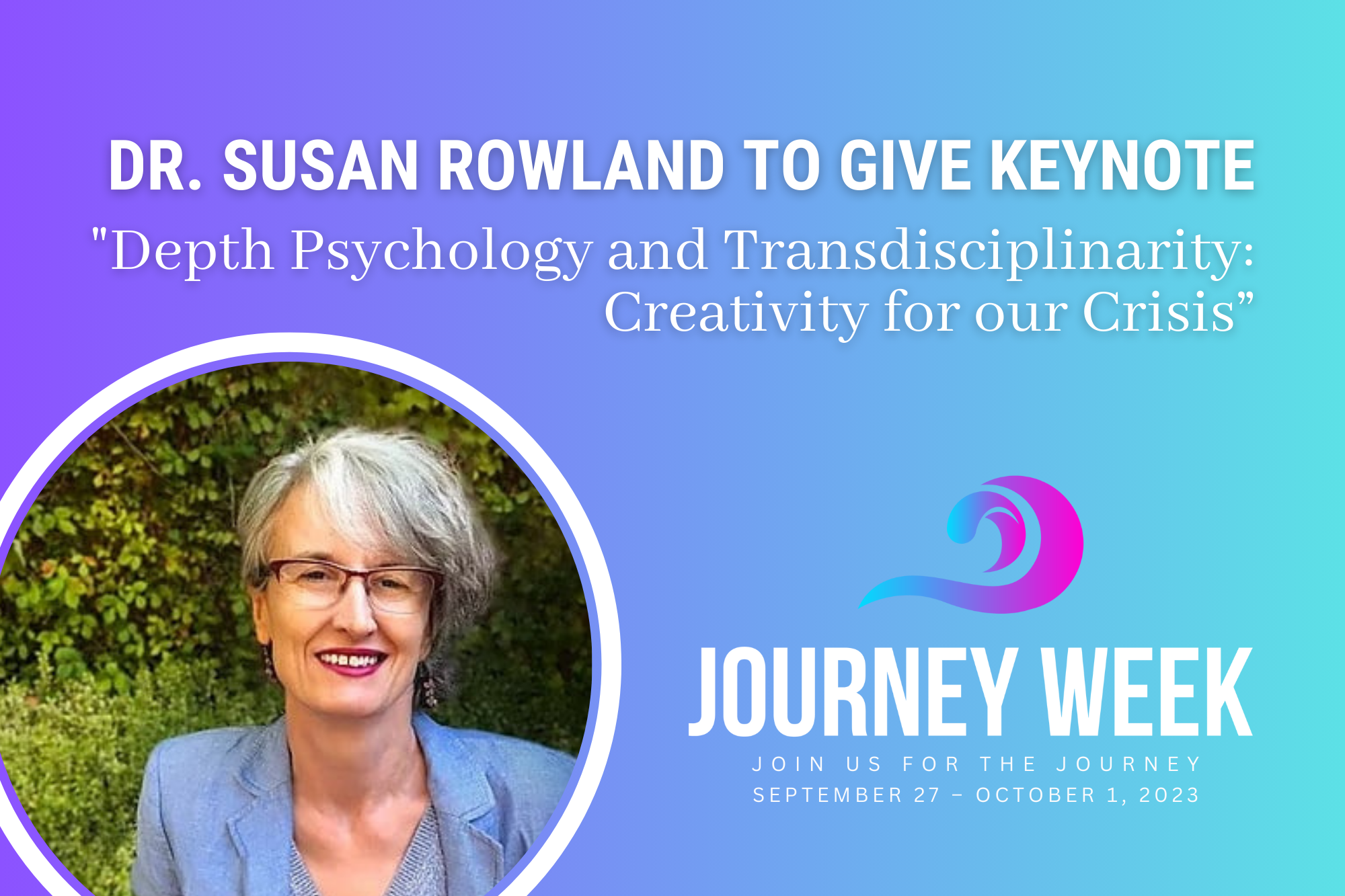As part of Pacifica’s Journeys of the Soul Conference, an immersive weekend of learning and connecting at Pacifica Graduate Institute to be held September 29 – October 1, Susan Rowland, Ph.D., a faculty member of Pacifica’s M.A. in Depth Psychology and Creativity with Emphasis in the Arts and Humanities department, the 2023 C.G. Jung Award recipient, as well as the author of the The Sacred Well Murders and The Alchemy Fire Murder, will speak about depth psychology, creativity, and crisis. I’m delighted to hear from her about her keynote address.
Angela: Journey Week will meet to “offer a space where we can come together as fellow travelers, for creative and soulful depth engagement with these themes, to listen to and learn from each other, to connect with nationally recognized leaders and learn from depth-oriented scholars and practitioners, to share our thoughts and our hearts, to appreciate our differences, and celebrate our achievements, to engage in dialogue and participate in deep reflection.” Why is it important that we meet in this way?
Susan: It’s important that we show the world how depth psychology can make an important contribution to the sense of crisis and anxiety in the world. My talk is going to start with Jung’s argument that western modernity is sick because of splitting. One of the fundamental ideas in depth psychology is the perception of being split, which is on the one hand a psychic splitting between conscious and unconscious, but psychic splitting leads to all other sorts of splitting, within cultures, between cultures, splitting between human culture and nature, and us being split up into autonomous individuals and feeling no sense of connection to anything. It leads to a loss of meaning. So much of our present crises are the result of western splitting being taken to an extreme, and that’s true when we look at politics, the climate crisis, our social crises, and the epidemic of mental illness. So Journey Week is trying to show how depth psychology can address these very big, intractable-looking issues that affect all of us.
Angela: It seems to me that in times of violence and dismay, creativity is often considered extracurricular or extraneous. The arts budget is always the first to be cut. I’m wagering that you would place creativity in the center of necessities when it comes to climate and mental illness crises. In broad terms, what is the value and function of creativity in such moments? And by creativity, do you mean writing novels, such as you have done, or something more conceptual?
Susan: It’s going to being conceptual and archetypal, but I’m going to use my novels as examples. How do you address splitting? Creativity is the only way to address the split, to bring the two sides or the fragmented parts of the psyche together. I’m going to use Dionysus and transdisciplinarity to show that on a big level but also an individual one. One of the splits is between the arts and science, and that’s how art gets marginalized and regarded as not important, because it doesn’t operate within the subject-object split. Western society acts as if the split between you and me is somehow the truth about the world. It’s not. It’s a way of perceiving the world. And if you take the subject-object split as hegemonic then there is no real place for creativity and the arts, which are about engaging with the other at multiple levels.

By “the other,” I mean whatever is deemed to be extraneous to the self. So the other is the unconscious, but it’s also you and me, it’s also nature as other, it’s technology as other, a different kind of human being, a different ethnicity, a different gender. We see the world in terms of entities that don’t have any really connection to each other. Creativity is fundamentally about letting the other come alive and be meaningful and be recognized as part of the self, the individual. So creativity is getting out of being stuck in the ego and about learning that we are connected and interconnected. Creativity is about learning that we’re all part of the collective unconscious and consciousness, that what we say and do affects other people in the world, even if we’re doing it on our own.
Angela: You will speak about depth psychology arts-based researched. What do you mean by that and why is it important?
Susan: One of the easy ways of putting this is that Jung considered thinking and feeling as conscious functions, and sensation and intuition as unconscious functions. In our split culture, research tends to be thought of as a thinking function only, but we actually need research that uses all four functions. In this content, art is a way of doing research that includes thinking, feeling, bodily sensations, and intuition. Arts-based research is a way of undoing the splitting around us that is causing so much anxiety and hostility.
Angela: You’ve mentioned the Transdisciplinarity of Basarab Nicolescu. How is transdisciplinarity crucial to “decolonization, relationships with indigenous cultures, and revitalization of the sacred”?
Susan: This version of transdisciplinarity basically includes everything and does away with hierarchy. If we look at what is generally meant by research and knowledge in university and in western culture, and these have excluded indigenous forms of knowing and have propagated colonialism, transdisciplinarity says that knowledges are valid and have relationships with each other, but it is not one of hierarchy, there is not one more fundamental than another. Hierarchy and colonialism are wrong, they’re not dealing with the essence of what knowledge is. You need to have a network of fluid relationships with no top knowledge and no bottom knowledge, so nothing is excluded or regarded as optional. This can be understood in depth psychology in terms of Dionysus, who I’ll be discussing in my talk.
Angela: Your talk will attempt the task of excavating the “radical, feminist and transdisciplinarity hidden depths” in Jung’s work “to support a revised social justice worldview.” How can the work of a man who lived from 1875 to 1961 be reinterpreted to field the crises of 2023?
Susan: It’s back to what I said first of all, that Jung diagnosed the fundamental problem of western modernity as splitting taken to extremes. The feminism comes in because one of the ways the psyche split is in terms of the feminine becoming the other and being marginalized in western modernity. Jung was a social conservative; however, his work is about making a relationship with the other and restoring the feminine in western modernity. So he’s always going on about the feminine, what he means is what is missing from the psyche of men. He sees the fundamental necessity of bringing back the feminine that has been lost, to heal the split. He sees it as healing the psyche of men, but in fact, it’s far more radical than that. Jung is a conservative with revolutionary ideas. His work has a revolutionary side, and if you pursue the implications of individuation, you get something that looks like a radical feminism.
Angela: Thank you so much for speaking with me, and I look forward to hearing more at Journey Week!
To hear Susan Rowland speak and to connect with other nationally recognized leaders, scholars, and authors, please join us for Journeys of the Soul Conference, an immersive weekend of learning and connecting at Pacifica Graduate Institute to be held September 29, 2023-October 1, 2023.

Susan Rowland (Ph.D.) was awarded the C. G. Jung Award by IAJS in 2023. Teacher at Pacifica Graduate Institute, she is author of ten books on Jung, the feminine and the arts and now of the Jungian Mary Wandwalker mysteries: The Sacred Well Murders (2022) and The Alchemy Fire Murder (2023), both published by Chiron. Further stories from the elements of air and earth to follow. She also co-authored with Joel Weishaus, Jungian Arts-Based Research and the Nuclear Enchantment of New Mexico (Routledge 2021) and her best known other book is Jung: A Feminist ReVision (2002).

Angela Borda is a writer for Pacifica Graduate Institute, as well as the editor of the Santa Barbara Literary Journal. Her work has been published in Food & Home, Peregrine, Hurricanes & Swan Songs, Delirium Corridor, Still Arts Quarterly, Danse Macabre, and is forthcoming in The Tertiary Lodger and Running Wild Anthology of Stories, Vol. 5.


